Real talk: If you want to see change, you have to make change — and that goes for your diet! With so many myths swirling around in the wellness world, though, it can be tough to figure out just which tweaks are worth the effort! And what is just a pain to shift into and doesn’t really make an impact, annoyingly so.
If you’re looking to make a shift to both feel and look better in the short term as well as make a positive difference in the long-term, consider the following science-backed suggestions that are part of our Beauty Detox world. I broke down the what, why and how of each shift to make it super easy for you to adopt these healthy habits!

Bubby says, “Listen to my Mama!” :)
1. Ditch the Dairy
Did you know that a whopping 65 percent of the human population is lactose intolerant? It’s no surprise, either. Once babies are weaned off their mother’s milk, they naturally begin to lose the enzyme that helps them digest lactose. Even for those who aren’t entirely intolerant to lactose, dairy can still be a major trigger for irritable bowel syndrome, among other digestive conditions, such as chronic constipation [1].
But those aren’t the only concerns when it comes to dairy. One study showed that women who consumed just one or more servings of skim or low-fat milk daily had a 32 percent higher risk of developing ovarian cancer and moreover, a 69 percent higher risk of serous ovarian cancer (as opposed to women who consumed 3 or fewer servings per month) [2].
What’s more, ditching the dairy could mean stronger bones. Crazy, right? As shocking as it may sound, recent research has begun to debunk the link between dairy products and bone health. In fact, in one study, researchers found that women not only gained no bone-strengthening benefit from drinking more milk but that drinking three or more glasses per day was associated with a significant increase in their risk of bone fracture [3].
If you’re seeking out foods that can ward off your risk of osteoporosis and keep your bones strong, there are plenty of other options beyond dairy products. Almonds and almond milk, sweet potatoes, kelp, sesame seeds, black-eyed peas, green veggies and white beans are all stellar vegan sources of bone-boosting calcium!
2. Cut out Meat (or at least cut waaay back!)
This one creates benefits for many reasons. When you cut meat out of your diet, you will make up for that food group with higher proportions of heart-healthy whole grains and nuts, as well as plenty of fruits and vegetables. As a result, you’ll likely be getting higher amounts of dietary fiber, vitamins, minerals and antioxidants. Remember- only plant foods have fiber! Need more incentive to trade in the chicken for chickpeas? A major study conducted by Massachusetts General Hospital, which was published in the JAMA Internal Medicine Journal, found that non-meat eaters have significantly lower death rates than meat-eaters.
Speaking of health risks for carnivores… researchers at Loma Linda University in California found that people who follow a vegetarian diet may have a lower risk of cancer overall — specifically cancers that are among women, like breast cancer [4].
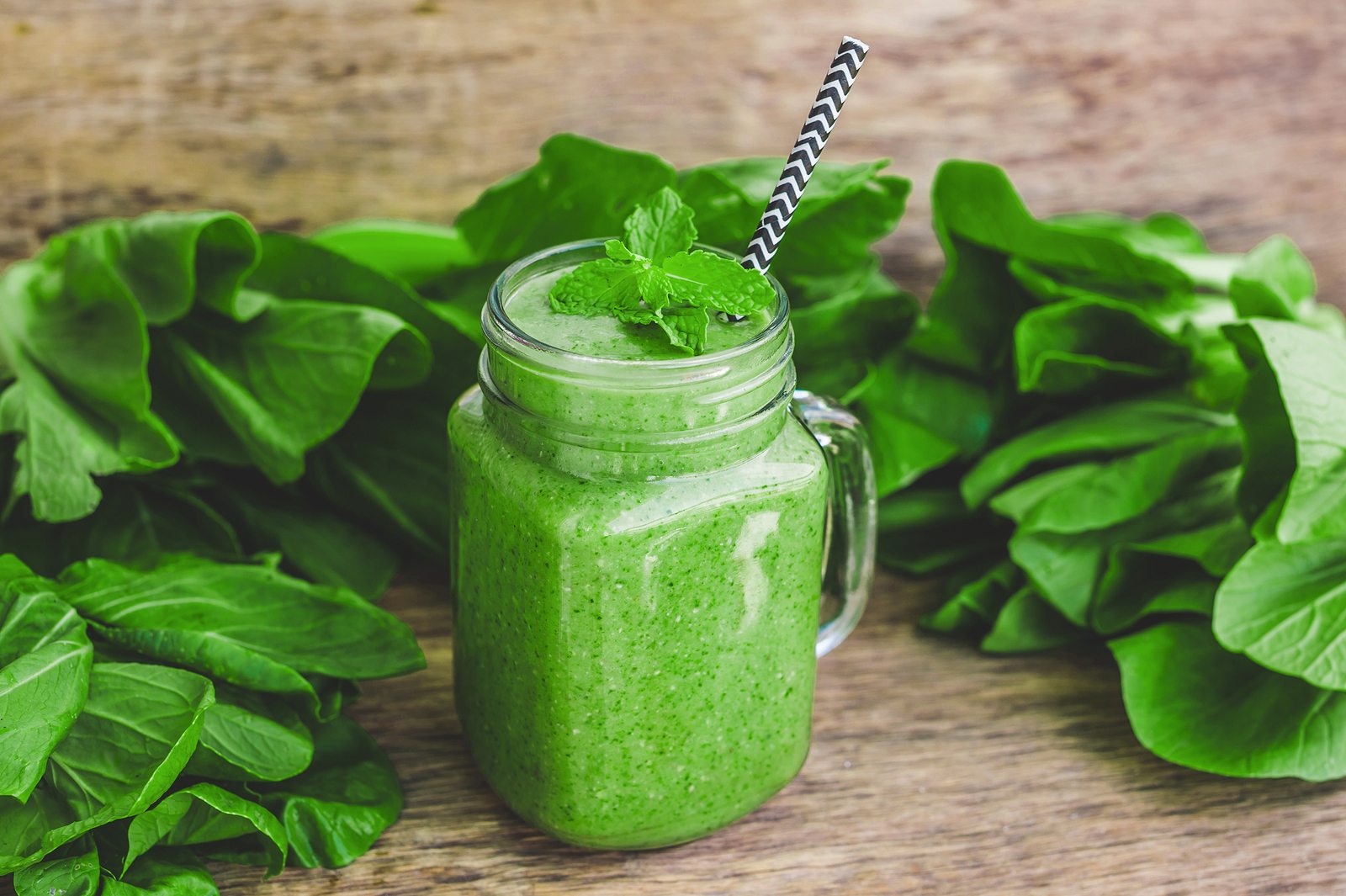
Making lifestyle changes a priority will not only benefit you physically, but mentally and emotionally too. Start by filling up on my Glowing Green Smoothie!
Beyond the physical benefits of going veg, there are also potential mental/emotional perks as well. A 2012 study divided participants into three diets: one in which all meat was allowed, one that was fish-only and one that was vegetarian.
What they discovered is that after just two weeks, people on the vegetarian diet reported a greater improvement in their mood than those on the other two diets. Pretty cool, huh? The key to happiness could really be in focusing on plant protein [5].
There are so many amazing dishes and foods that make plant-based eating easy- please check out all the recipes here on my site and in my books I offer you! This is a big point as we live in the era of a lot of low carb/meat-centric diets out there. But remember that an all or mostly plant-based diet will leave your body cleaner, lower in toxins (even organic, free-range meat and chicken is the primary source of environmental toxins into the human body!) and more beautiful, light and full of life-affirming vitality!
3. Pick up Probiotics (that actually work!)
First off, if you don’t know what probiotics are, these powerful organisms contain beneficial bacteria. Fun fact: the word “probiotic” combines two Greek words: “pro,” which means promotion of and “biotic,” which means life. The name says it all! Probiotics have been shown to strengthen your immune system, improve digestion, promote weight loss and even protect you from certain ailments and diseases, among other amazing things.
IBS and Crohn’s disease are highly tricky to treat — but luckily, according to Harvard Health Publications, certain probiotics may help people prevent relapses of these conditions [6].
While we’re on the subject of digestion, a 2010 review of five separate studies, which was published in the World Journal of Gastroenterology, found that some strains improved the frequency of bowel movements (and stool consistency) in people who struggled with constipation [7].
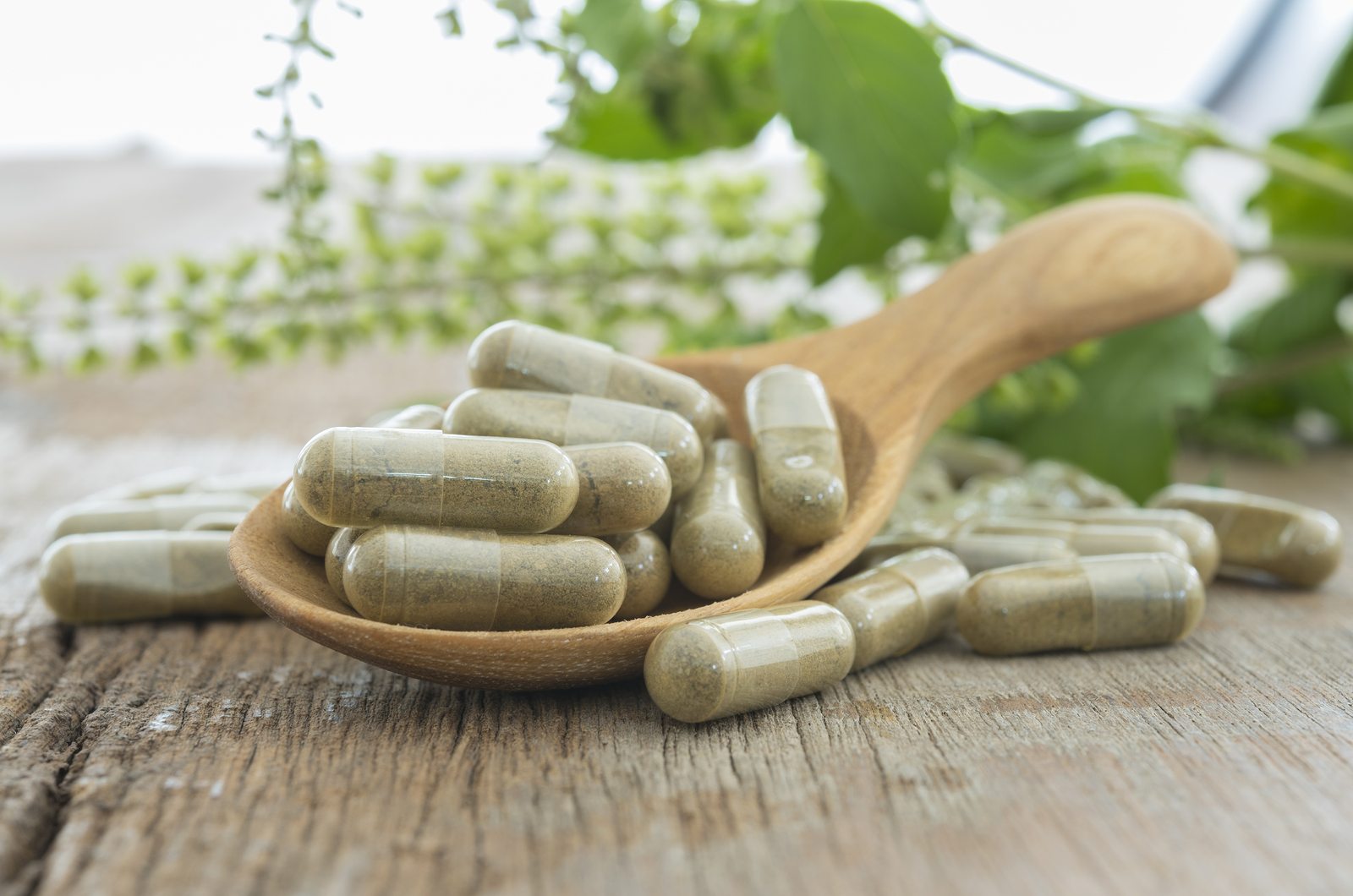
Do your research before purchasing any probiotics, to ensure you are giving your body only the best ingredients!
By the way — probiotics could help ward off illness. That’s because several studies, including one published in the British Journal of Nutrition, have revealed that certain probiotic strains give your immune response a boost [8]!
And if you have goals geared toward weight loss, consider this: Recent research published in the journal Obesity found that men who consumed a shake with a probiotic blend in it had lower body mass gain and fat accumulation than those who didn’t over the course of the study [9].
Another study published in the British Journal of Nutrition reported that overweight women who consumed probiotics on a daily basis shed twice the number of pounds than women who took placebos over a 24-week period [10].
By the way, a growing body of research has shown that certain bacteria can actually have a positive influence on your mood by producing feel-good compounds that travel from your gut to your brain. Pretty impressive, huh?
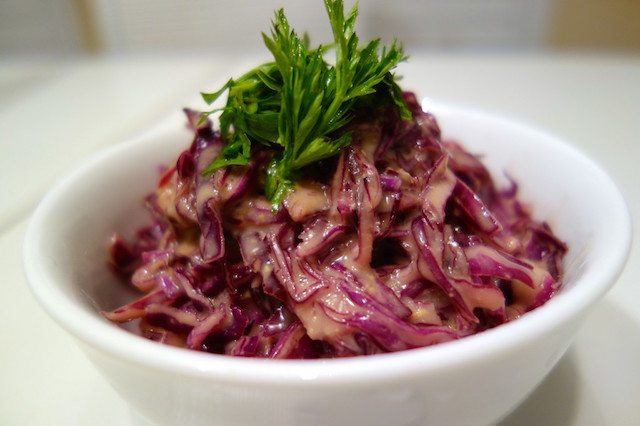
My Probiotic Beauty Slaw adds some healthy probiotics to your meals- though is in no way a replacement for the powerful SBO Probiotic supplement I wholeheartedly recommend!
A study published in the journal Brain, Behavior, and Immunity even revealed that taking probiotics intake can help reduce negative thoughts associated with a sad mood [11].
First thing’s first, though: You definitely want to make sure that you’re consuming soil-based probiotics, such as bacillus subtilis, to fully reap the benefits. Lactobacillus, acidophilus and bifidobacteria, the kind found in yogurt and most traditional supplements, don’t typically reach the lower intestine, so they won’t offer nearly as many positive effects.
There are also plenty of foods you can introduce into your diet that boast beneficial bacteria. Some probiotic-rich options include miso, fermented cabbage (kimchi) and tempeh. Try an energy-boosting Probiotic & Enzyme Salad, some tangy Beauty Slaw for better skin, satiating Tempeh Gyro Lettuce Wraps, or a flavor-packed Ginger Miso Golden Beet & Fennel Salad.
Keep in mind that while these foods are ultra nutritious, you still won’t get maximum benefits without taking the proper supplementation.
4. Make Salad a Daily Habit
Eating a salad every day is one change that could have a huge payoff in the long run — in a wide range of ways! Leafy greens and other raw vegetables obviously have a ton of vitamins and minerals, but they are also brimming with natural fiber, which offers multiple benefits: it helps to keep your blood sugar under control, minimize the LDL or “bad” cholesterol, keep you feeling full for longer (which helps with maintenance of a healthy weight), and normalizes your bowel movements.
Did I mention there are mental perks to munching on salad regularly, too? A multi-year study at Rush University in Chicago found that elderly participants who ate leafy greens like spinach and kale on a regular basis had much sharper minds than those who did not — on average, they were 11 years younger in terms of their mental capacity! Just something to consider if you’re looking to ward off Alzheimer’s disease and dementia down the line [12].
There are infinite possibilities to mixing up the ingredients in your salads, make it less likely you get bored with eating them. You can stop by a local farmer’s market to see what’s in season for the freshest possible produce and the maximum amount of nutrients, and always opt for organic produce to avoid nasty pesticides.
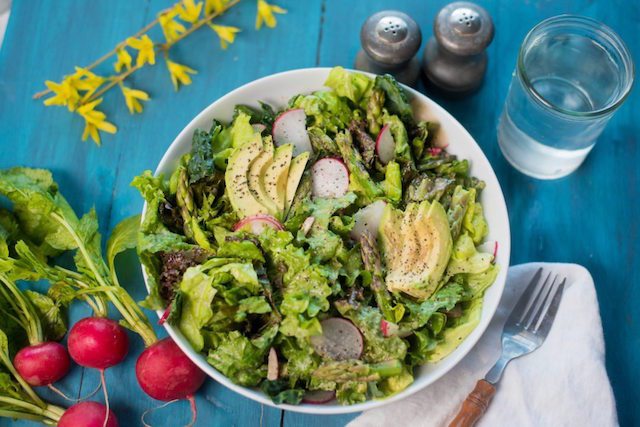
My Radish & Asparagus Salad Recipe will make it easy for you to switch up your veggies often, so you can benefit from the variety of nutrients more fully.
Try to incorporate a range of veggies, fruits, nuts and seeds for differing textures to get the most satisfying meal and moreover, to ensure you’re getting a wide variety of nutrients. That means continually rotating which greens you use as a base — and don’t overlook, romaine, either! Unlike iceberg, it does have nutritious value, so it can serve as a welcome green to rotate in amongst kale, spinach, arugula, etc.
Need some salad inspiration? Try a hydrating, skin-enhancing Creamy Cucumber Olive Salad for a refreshing summer lunch, a cleansing Radish Asparagus Salad or a colorful and crunchy Bell Pepper Medley Kale Salad.
Just be careful not to take away from all the positive effects you’re getting in that salad, Beauties, with some sneaky salad sabatogers. Swap out cheese for nutritional yeast, and croutons for crumbled gluten-free crackers or raw nuts. Store-bought dressings are often loaded with saturated fat, sodium, high-fructose corn syrup, GMOs, preservatives and other nasty stuff you definitely don’t want in your system.
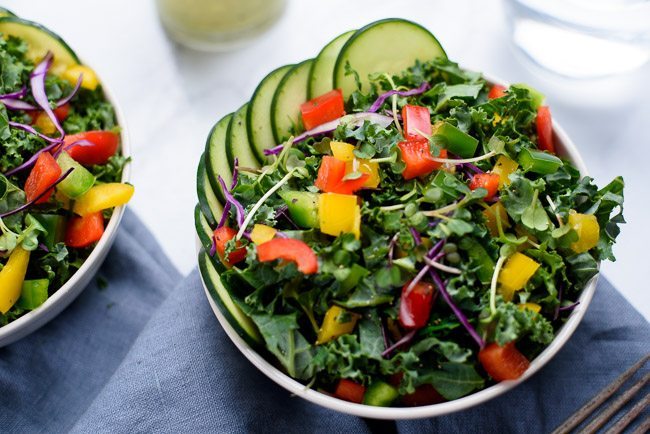
Don’t forget the kale! Give my Bell Pepper Medley & Kale Salad Recipe a try and your gut will thank you!
Making your own dressing is a solid way to ensure you know what you’re pouring over your greens is healthy — plus you can tweak the proportions of the ingredients to your liking! For example, Oil-Free Red Pepper and Cilantro Dressing has a nice kick to it that will spice up your bowl, but if you’re craving something richer, go for a Dreamy Creamy Avocado Dressing.
5. Break Up With Sugar!
By now, you probably know that refined and processed sugar can totally sabotage your weight, but it’s also been linked to a slew of serious health problems. In fact, a growing body of research on sugar has shown it can negatively impact your brain function, heart health and overall mood.[13, 14, 15].
Not only that, but a major study published in JAMA Internal Medicine found that a sugar-laden diet could increase your risk of dying of heart disease — even if you aren’t overweight [16]!
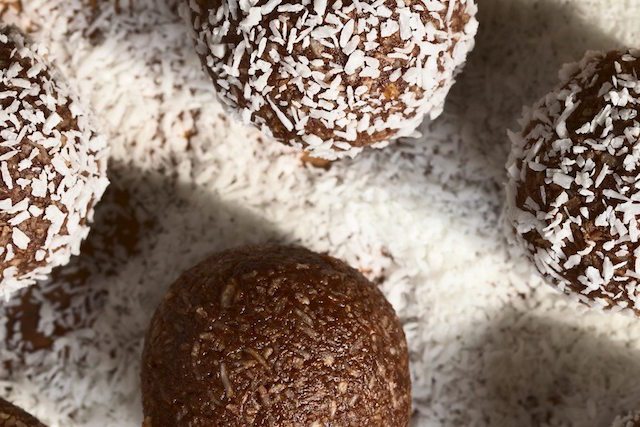
Instead of indulging in refined and processed sugars, give my Raw Cacao Truffles Recipe a try. I promise you won’t miss out on all those other refined and high fructose-containing sugars! Xx
That doesn’t mean you can’t satisfy your sweet tooth, though. You deserve to treat yourself without all the potential havoc sugar can wreak on your body! Depending on the recipe, you can easily swap out sugar for other ingredients like stevia, erythritol (a sugar alcohol made from plant foods that is also zero calorie) or a small amount of coconut nectar or the occasional date (as long as you are not a Blossoming Beauty, ie the first phase in The Beauty Detox Solution).
In smoothies and shakes, you’ll be amazed at what spices like cinnamon and nutmeg can do as a flavorful substitution. Even stevia is a fine swap to make — studies have suggested that unlike refined and processed sugar, which spikes your blood sugar — it results in lower post-meal blood sugar and insulin levels. Just be sure you’re buying pure, natural, organic and alcohol-free stevia! You could even plant some in your garden at home and make your own extract (that is if you are a super gardener and have the time! Admittedly I am not doing this), [17] .
Hunting for desserts that have healthier sugar alternatives? Here are a few ideas to get you started:
- Raw Cacao Truffles, which are rich-tasting and can crush a craving in an instant.
- Thyroid Boosting Coconut Macaroons, an indulgent snack with added health benefits.
- Raw Chocolate Ginger Cake with Cacao Frosting, which is loaded with beautifying, healthy fats.
- Raw Pecan Love Pie, which boasts multiple beauty fruits.
Also, P.S. If you haven’t heard… my new digital program releases tomorrow:
My 30 Day Roadmap For Healthy Weight Loss! Find out more here!
In love and health,
Kimberly
[1] lactose intolerance[2] A prospective study of dietary lactose and ovarian cancer.
[3] Milk intake and risk of mortality and fractures in women and men: cohort studies
[4] Vegetarian Diets and the Incidence of Cancer in a Low-risk Population
[5] Restriction of meat, fish, and poultry in omnivores improves mood: a pilot randomized controlled trial.
[6] Health benefits of taking probiotic
[7] Systematic review of randomised controlled trials: Probiotics for functional constipation
[8] Evaluation of the immune benefits of two probiotic strains Bifidobacterium animalis ssp. lactis, BB-12® and Lactobacillus paracasei ssp. paracasei, L. casei 431® in an influenza vaccination model: a randomised, double-blind, placebo-controlled study
[9] Probiotic supplementation attenuates increases in body mass and fat mass during high-fat diet in healthy young adults
[10] Effect of Lactobacillus rhamnosus CGMCC1.3724 supplementation on weight loss and maintenance in obese men and women
[11] A randomized controlled trial to test the effect of multispecies probiotics on cognitive reactivity to sad mood
[12] Diet May Help Prevent Alzheimer’s
[13] This is your brain on sugar: UCLA study shows high-fructose diet sabotages learning, memory
[14] Dietary sugars intake and cardiovascular health: a scientific statement from the American Heart Association.
[15] Why a Sugar High Leads to a Brain Low
[16] Added Sugar Intake and Cardiovascular Diseases Mortality Among US Adults
[17] Effects of stevia, aspartame, and sucrose on food intake, satiety, and postprandial glucose and insulin levels.

Geeking out at a local farmer’s market in Tokyo. Damn the Japanese have amazing artisanal products and style! I am obsessed and inspired. Sending love! xo

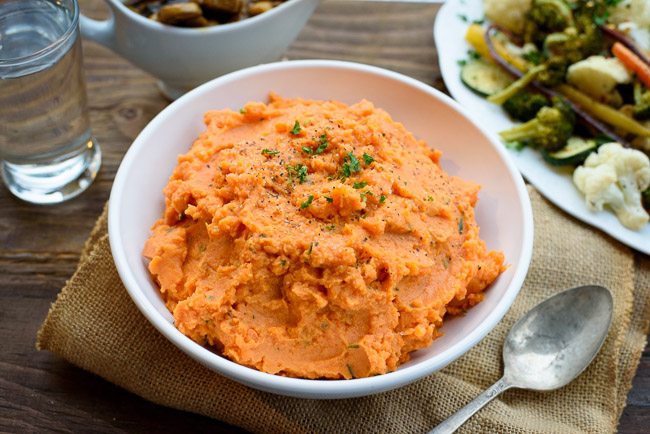
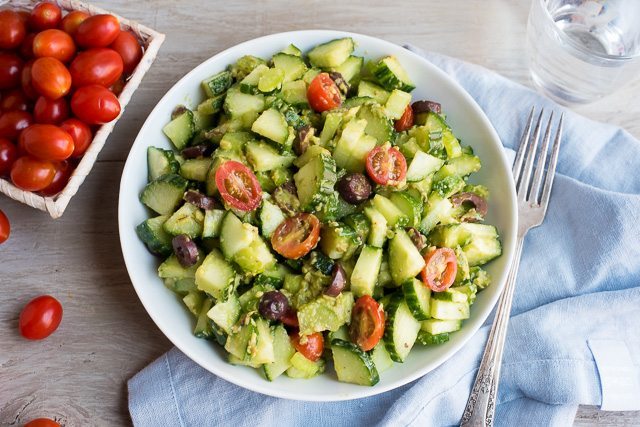
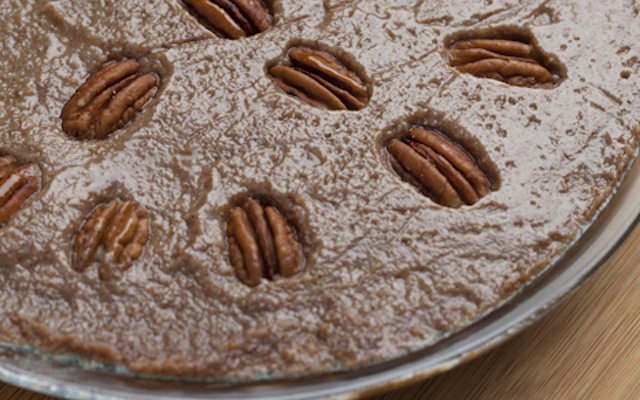

Awesome tips!! I think the hardest part for me is the daily salad, eating it is not a problem, but I don’t really like preparing salads all the time… Still, worth giving it a try!
The prepping can be one of the biggest hurdles but meal planning the night before can definitely be helpful to stay on track. Sending you lots of love and support! ;)